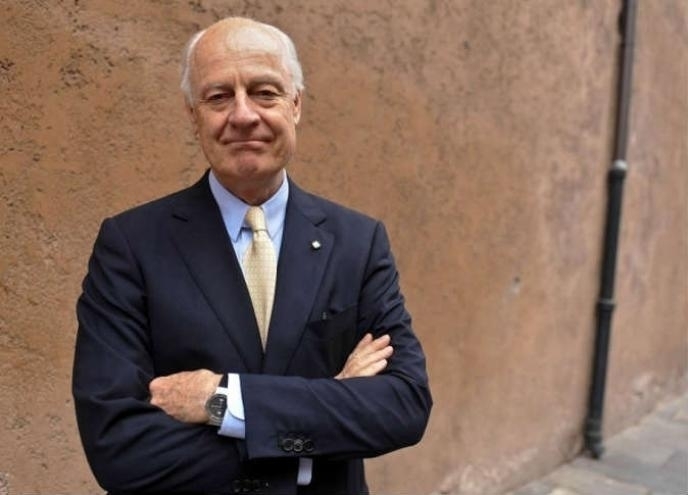United Nations Special Envoy for Syria Staffan de Mistura announced Tuesday the heads of four working groups responsible for gathering representatives of the Syrian regime, the opposition and civil society organizations next month ahead of the UN’s annual gathering of world leaders.
The step has seemingly earned approval from the Syrian government and the opposition to launch month-long parrallel negotiations to discuss safety and protection of civilians; political and constitutional issues; combatting terrorism and military and security issues; and reconstruction and development, AP reported.
The heads of the four working groups, which de Mistura plans to meet in Geneva this week, are: the Chairman and Director of the German Institute for International and Security Affairs and expert in Syrian affairs, Volker Perthes; the head of the Norwegian Refugee Council, Jan Egeland; the former Swedish Ambassador to Baghdad, Birgitta Holst Alani; and the UN Under-Secretary-General for Legal Affairs, Nicolas Michel.
The UN envoy is awaiting a list of dozens of candidates from the Syrian government and opposition factions to form the four groups in addition to the formation of a committee of experts and advisers from all Syrian parties to support the work of his team. De Mistura hopes to complete the picture before meeting with the Security Council for high-level meetings, which are aimed at acquiring political support for his effort.
De Mistura visited Damascus two days ago to meet with Syrian Foreign Minister Walid al-Muallem and the president of the National Coordination Commission for Democratic Change, Hassan Abdul Azim, before travelling to Istanbul to meet with the Political Committee of the Syrian National Coalition (SNC) in an attempt to put the final touches on the mechanisms of the plan.
According to Syria’s state news agency, SANA, de Mistura responded to inquiries from the Syrian government, explaining the meetings of the working groups would “be for brainstorming and would be non-binding”, adding whatever the Syrians come to agree may be helpful in the process of preparing for Geneva III.
Muallem, for his part, reiterated that fighting terrorism in Syria is the priority as it constitutes the entry for the political solution to the crisis in the country and meets the Syrian people’s aspirations for establishing security and stability, adding that Syria will study the ideas put forth by de Mistura so as to take the appropriate stance towards the initiative.
The SNC recently stated the UN envoy provided "answers to the questions and inquiries of the Political Committee", adding the Committee has "continued its consultation with military factions, other political opposition parties and civil society organizations. The results of these consultations will be represented later to the General Committee to make the right decisions about them."
Major armed opposition factions, including Ahrar ash-Sham and the Army of Islam, were openly defiant towards de Mistura's proposal, stressing in a joint statement that the Security Council's statement offers a suitable environment to initiate substantive political negotiations and to build confidence between the parties. The factions called on de Mistura to proceed with the implementation of the Geneva statement under regional and international guarantees, without resorting to lengthy procedures, which would “consequently discharge the Geneva statement from its content.” The factions also stressed any political process should require the unconditional departure of Assad and all the pillars of his regime.
The Syrian government has insisted on prioritizing the terrorism file before discussing any other political issue, a position in direct contrast to that of the Coalition, which insists on first discussing the formation of a transitional governing body under the Geneva statement. This difference in priorities contributed to the failure of the second Geneva negotiations last year.
Yet, during his talks with Muallem and the Coalition, de Mistura insisted on parallel negotiations between the four working groups, and that the meetings should take place according to a specific timetable and away from media coverage, but will stay in direct communication with their political references, whether in Damascus or in Istanbul. The results of the negotiations, it was stressed, would not be binding, but would instead be limited to moral assurances. De Mistura explained his awareness of the difficulty of "brainstorming" in political, military and security matters, but said he expects the humanitarian aid team to "make a breakthrough."
At a meeting recent in Damascus, the envoy told Syrian officials, "there are two trains: the first one is the working teams who will pass time to the middle of November. The second is the Contact Group, and this is the basic train because it will include the international understanding." De Mistura did not exclude an American-Russian understanding to save negotiations, contrary to events at Geneva II, when the crisis between Washington and Moscow over Ukraine led to the collapse of negotiations between the Syrian government and the opposition.
This article was translated and edited by The Syrian Observer


